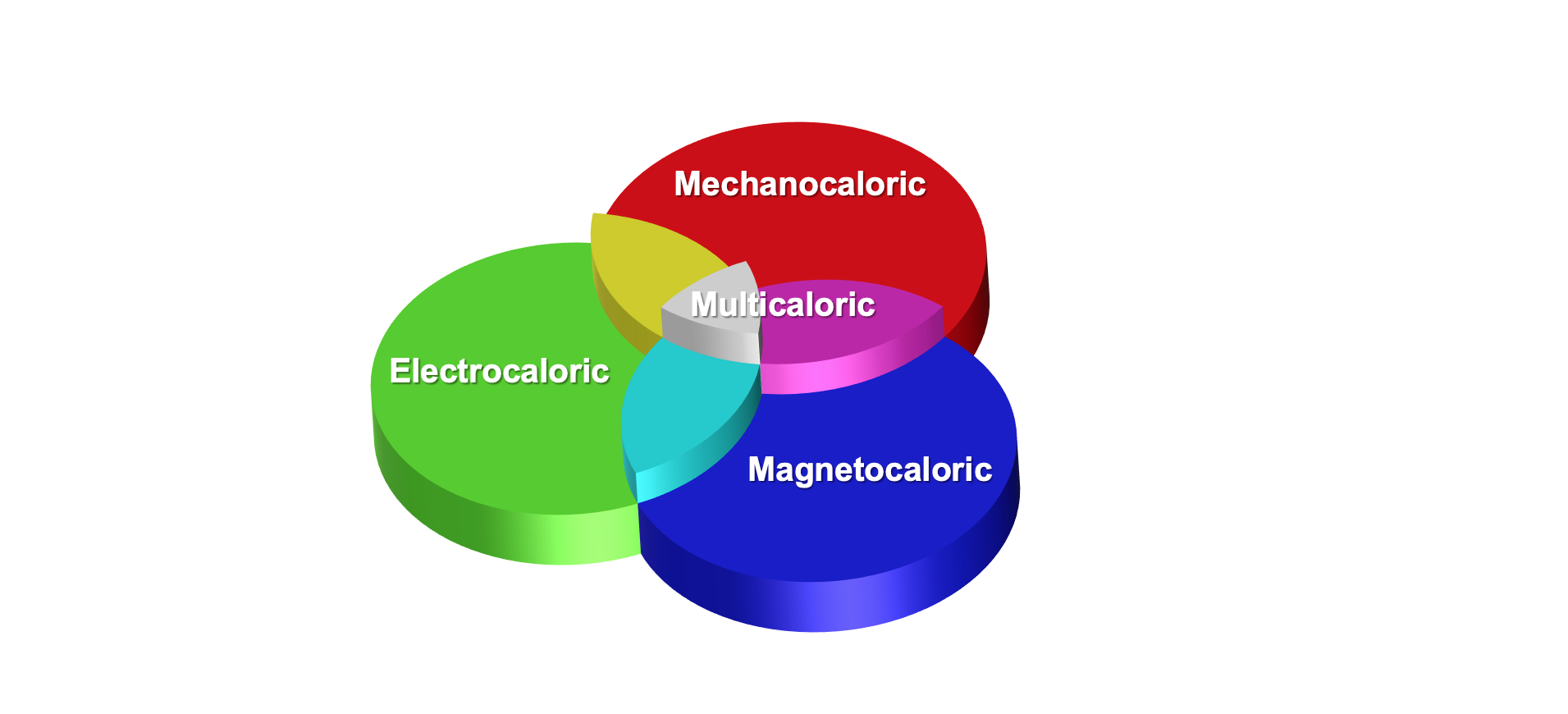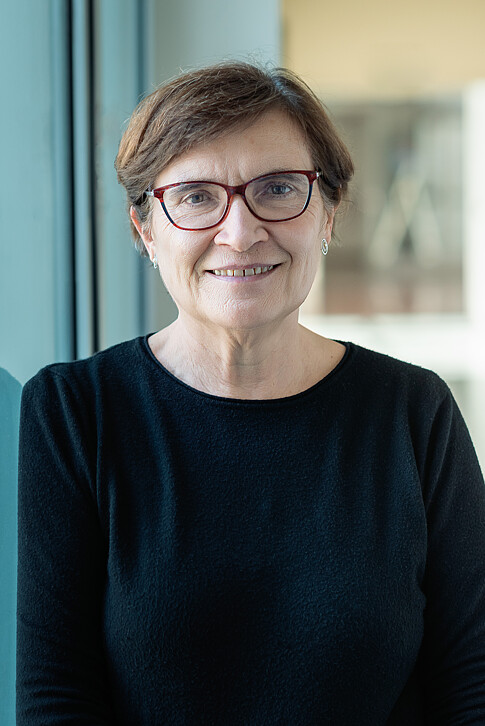PID2020 ACMUMA
Advanced Caloric and Multicaloric Materials for Efficient and Clean Refrigeration (ACMUMA)Some materials exhibit large energy exchanges when subjected to the action of external forces or fields. These effects are called caloric effects and are divided into three main groups: mechanocaloric (caused by mechanical forces), electrocaloric (caused by electric fields) and magnetocaloric (caused by magnetic fields).
When a material responds to more than one of these external stimuli, we speak of multicaloric effects.

The PID2020 ACMUMA project opens two lines of research:
- The study of multicaloric effects in metallic and molecular composites; and
- The study of dynamics and caloric effects under inhomogeneous stimuli.
The materials investigated in this project are non-toxic, easily accessible and non-strategic.
Among others, metals, alloys and polymers are studied.
PID2020 ACMUMA is the natural follow-up to the MAT2016-75823-R project, “Responsive Materials for Clean and Efficient Cooling”.
The key results obtained by the research team in the framework of this earlier project represented a breakthrough in general knowledge, and opened up new lines of research.
The research in PID2020 ACMUMA aims to consolidate the momentum gained, to achieve a significant breakthrough in the study of caloric and multi-caloric materials.
In the medium term, this increased knowledge may have a technological impact, providing guidelines for designing new, clean and efficient cooling devices.
Cooling and heating
Energy harvesting systems
Energy harvesting systems
functionalmaterials@ub.edu
Project team

Eduard Vives Santa-Eulalia
Principal Investigator (PI)

Lluis Mañosa Carrera
Principal Investigator (PI)

Teresa Castán Vidal
Researcher

Antoni Planes Vila
Researcher
Work team

Eduardo Mendive Tapia
Work team

Marcel Porta Tena
Work team
Collaborations
Michela Romanini (UPC – Barcelona)
Tino Gottschall (HZDR – Dresden, Alemanya)
Adrià Gràcia Condal (ALBA – Barcelona)
Avadh B. Saxena (LANL, Los Alamos – USA)
Featured publications
Eduardo Mendive Tapia, Christopher E Patrick, Tilmann Hickel, Jörg Neugebauer and Julie B Staunton
Quantification of electronic and magnetoelastic mechanisms of first-order magnetic phase transitions from first principles: application to caloric effects in La(FeSi)13
Journal of Physics: Energy 5, 034004 (2023).
Lluís Mañosa, Enric Stern-Taulats, Adrià Gràcia-Condal, and Antoni Planes
Cross-coupling contribution to the isothermal entropy change in multicaloric materials
J. Phys.: Energy (2023)
Marcel Porta, Teresa Castán, Avadh Saxena, and Antoni Planes
Caloric Effects Induced by Uniform and Non-uniform Stress in Shape-Memory Materials
Shape Memory and Superelasticity, https://doi.org/10.1007/s40830-023-00412-6, (2023)
Adrià Gràcia-Condal, Antoni Planes, Lluís Mañosa, Zhiyang Wei Jianping Guo, Daniel Soto-Parra, and Jian Liu
Magnetic and structural entropy contributions to the multicaloric effects in Ni-Mn-Ga-Cu
PHYSICAL REVIEW MATERIALS 6, 084403 (2022)
Clàudia Pérez-Junyent, Marcel Porta, Emma Valdés, Lluís Mañosa, Antoni Planes, Avadh Saxena, and Eduard Vives
Flexocaloric effect in superelastic materials
APL Materials 10, 121103 (2022)
Nicolas Candau, Eduard Vives, Ana Inés Fernández, Oguzhan Oguz, Guillaume Corvec, Carlos Eloy Federico, João Paulo Cosas Fernandes, Gregory Stoclet, Maria Lluïsa Maspoch
Observation of heterogeneities in elastocaloric natural/wastes rubber composites
Express Polymer Letters 16, 1331–1347 (2022)
Fei Xiao, Ashley Bucsek, Xuejun Jin, Marcel Porta, Antoni Planes
Giant elastic response and ultra-stable elastocaloric effect in tweed textured Fe-Pd single crystals
Acta Materialia 223, 117486 (2022)
Lukas Pfeuffer, Adrià Gràcia-Condal, Tino Gottschall, David Koch, Tom Faske, Enrico Bruder, Jonas Lemke, Andreas Taubel, Semih Ener, Franziska Scheibel, Karsten Durst, Konstantin P. Skokov, Lluís Mañosa, Antoni Planes, Oliver Gutfleisch
Influence of microstructure on the application of Ni-Mn-In Heusler compounds for multicaloric cooling using magnetic field and uniaxial stress
Acta Materialia 217, 117157 (2021)
Nicolas Candau, Eduard Vives, Ana Inés Fernández, Maria Lluïsa Maspoch
Elastocaloric effect in vulcanized natural rubber and natural/wastes rubber blends
Polymer 236, 124309 (2021)
Guillem Capellera, Lucia Ianniciello, Michela Romanini and Eduard Vives
Heat sink avalanche dynamics in elastocaloric Cu-Al-Ni single crystal detected by infrared calorimetry and gaussian filtering
Appl. Phys. Lett. 119, 151905 (2021)
Marcel Porta, Teresa Castán, Avadh Saxena and Antoni Planes
Flexocaloric effect near a ferroelastic transition
PHYSICAL REVIEW B 104, 094108 (2021)
Fei Xiao, Zhu Li, Hong Chen, Xuejun Jin , Antoni Planes and Takashi Fukuda
Origin of the inverse elastocaloric effect in a Ni-rich Ti-Ni shape memory alloy induced by oriented nanoprecipitates
PHYSICAL REVIEW MATERIALS 5, 053603 (2021)


